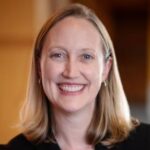by James A. Bacon
The University of Virginia has created two new committees: one to articulate the university’s commitment to free expression and inquiry, and another to examine naming and memorials on the grounds (as the UVa campus is referred to).
“We are working to give voice to our commitment as an educational institution to the free and open exchange of ideas, and to grapple with the complexities of our University’s history and the names that we honor,” Ryan said in making the ann0uncement. “These committees will help us forge a path forward as we continue to address these issues as a community and as a nation.”
First Amendment expert Leslie Kendrick, vice dean of the School of Law, will chair the Committee on Free Expression and Free Inquiry. According to UVAToday, the group will craft a statement that “identifies the role that free expression and free inquiry play in UVA’s academic enterprise and how they shape engagement with the ideas of others.”
UVa officials did not explain what prompted the creation of the committee, but the university has been racked by a number of free speech/free expression controversies recently.
In one, a resident of the Lawn posted a sign on her door last semester saying, “F— UVA,” prompting outrage among many alumni. President Ryan refused to order her to take down the sign on the grounds that she was protected by the right to free speech. However, administrators did agree to enforce its contracts with Lawn residents more rigorously in the new semester by forbidding door signs of any nature.
In another incident that went viral on UVa social media, a Commerce School professor created a furor after he told a joke based on stereotypes of different peoples around the world, including Africans, that some students found racially insensitive. The professor issued an apology. In the discussions that followed, some students called for UVa to create mechanisms to report and discipline professors who engage in what they consider to be racist speech.
One other factor that might have figured into the UVa decision: The Foundation of Individual Rights in Education (FIRE) conducted an extensive survey of student that found that a spirit of intolerance on college campuses, including UVa, rendered many students reluctant to speak freely. At UVa, a large group of alumni (of which I am one) has expressed vocal discontent about the suppression of unpopular views and called for the administration to stand up for free speech and expression. Some have called for UVa to adopt the Chicago Principles of Free Expression.
UVa’s free-speech committee will be comprised of 12 members, most of whom are UVa faculty members. They include:
- Leslie Kendrick, committee chair and vice dean of UVA’s School of Law and director of the Center for the First Amendment at UVA Law.
- Mary Kate Cary, practitioner senior fellow at UVA’s Miller Center and former speechwriter for President George H.W. Bush.
- Rita Dove, former U.S. Poet Laureate and Commonwealth Professor of English.
- Dr. Susan Kirk, professor, endocrinologist and associate dean for graduate medical education, and chair-elect of the Faculty Senate.
- Joel Gardner, former senior managing director at Burnham Securities, and a UVA and UVA School of Law alumnus.
- Allen Groves, dean of students.
- John Griffin; Board of Visitors member and founder and president of Blue Ridge Capital investment firm.
- Kevin McDonald, vice president for diversity, equity, inclusion and community partnerships.
- Jahan Ramazani, University Professor and Edgar F. Shannon Professor of English.
- Saonee Sarker, senior associate dean of the McIntire School of Commerce and Rolls-Royce Commonwealth Commerce Professor.
- Frederick Schauer, David and Mary Harrison Distinguished Professor of Law.
- Mazzen Shalaby, Board of Visitors student member.
The outcome of the committee’s deliberations undoubtedly will reflect the ideological inclinations of the members. I know very little about most of these individuals, so I venture no predictions. However, I would note that the appointment of Joel Gardner to the group is reassuring. He wrote a scathing letter to President Ryan, which I broke into two parts and published in Bacon’s Rebellion:
The Greatest Threat to Academic Freedom and Integrity in UVa’s History
UVa Needs to Shut Down the Echo Chamber
Members of the UVa community can be assured that there will be at least one forceful voice to champion the values of free speech, free expression, and tolerance of diverse views.
